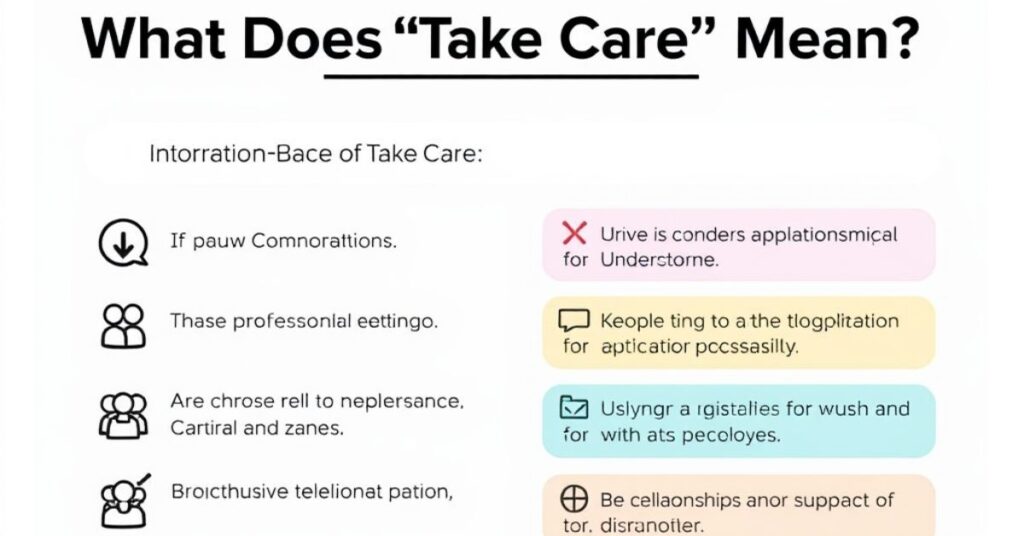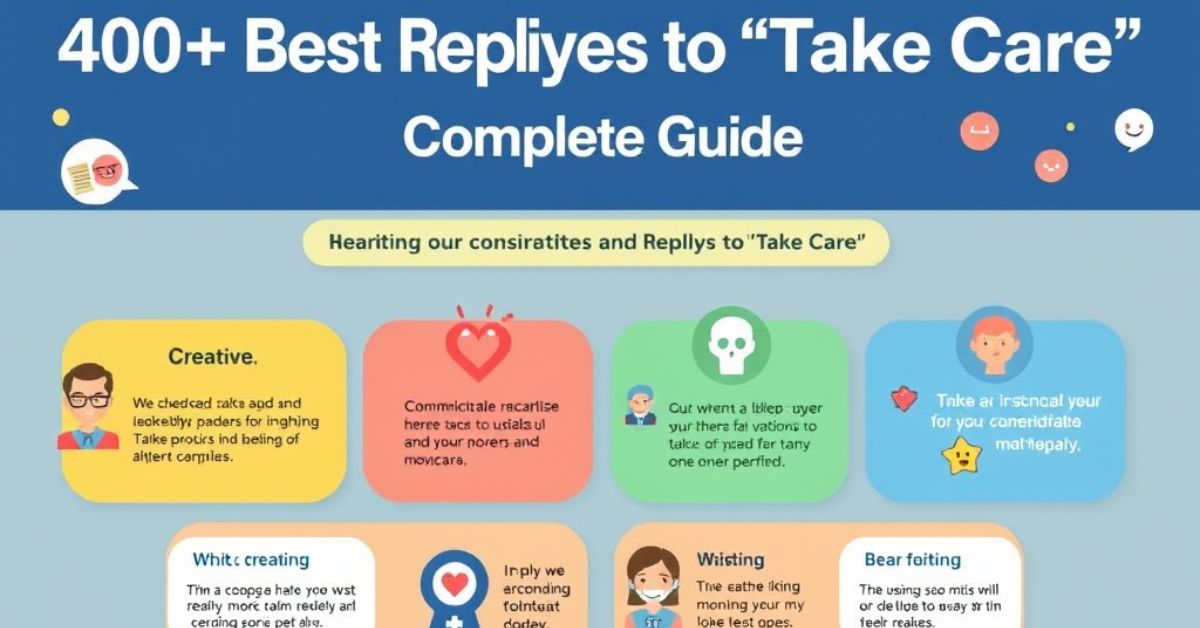“Take care” is a phrase we hear often, whether in casual conversations, professional exchanges, or messages from loved ones. It’s a simple yet powerful way to express concern for someone’s well-being. But have you ever considered how to respond when someone wishes you to take care?
In this comprehensive guide, we’ll explore over 400 responses to “take care,” delve into its meaning, and discuss the nuances that come with this common phrase. Let’s dive in!
200+ Replies to “Take Care”
When someone tells you to take care, your response can convey your personality and the nature of your relationship.
Here are some creative ways to reply:
- Simple Acknowledgements
- “Thanks, you too!”
- “Will do! Take care of yourself as well.”
- “I appreciate it! Stay safe!”
- Witty Responses
- “Only if you promise to do the same!”
- “Care is my middle name!”
- “I’ll take care, but only if you take care of the cookies!”
- Humorous Replies
- “Only if you promise not to worry too much!”
- “I’ll take care—unless I find a pizza in the fridge!”
- “Sure, as long as ‘care’ doesn’t involve exercise!”
- Warm and Heartfelt
- “Thank you! Your kindness means a lot.”
- “I will, and I hope you do too!”
- “Your well-wishes always brighten my day.”
- Casual and Friendly
- “Thanks, I will! Catch you later!”
- “Take care, buddy! Let’s chat soon.”
- “You got it! See you around!”
What Does “Take Care” Mean?

“Take care” is an expression of goodwill, often used to wish someone well as they part ways. It implies a desire for the other person to look after their health and happiness.
This phrase can range from a casual farewell to a deeper expression of concern, depending on the context.
Why Do People Say “Take Care”?
People say “take care” as a way to show they care about your well-being. It’s a gentle reminder to prioritize self-care, especially during stressful times.
The phrase can also serve as a polite way to end a conversation, leaving the door open for future interactions.
Understanding the Context of “Take Care”
The context in which “take care” is used can significantly affect its meaning. In casual settings, it may simply reflect polite conversation, while in more serious situations, it can indicate genuine concern. Understanding the context helps you craft an appropriate response.
Cultural Variations of “Take Care”
Different cultures have unique ways of expressing care. In some cultures, phrases like “stay safe” or “look after yourself” may be more common. Recognizing these variations can enhance communication and foster deeper connections.
When “Take Care” Feels Dismissive
Sometimes, “take care” can come off as dismissive, especially if said in a hurried manner or without genuine sentiment. If you sense that it lacks warmth, consider responding with a light-hearted comment to keep the conversation engaging.
Responding to “Take Care” in Professional Settings
In a professional context, a more formal response may be appropriate.
Here are some examples:
- “Thank you, I appreciate your concern.”
- “I will, thank you. Wishing you success as well.”
- “Take care, and let’s keep in touch!”
Unique Responses to “Take Care”
If you want to stand out, try these unique responses:
- “I’ll take care, but only if you promise to share your secrets to success!”
- “Thanks! I’ll take care of myself and my plants!”
- “I’m taking care like it’s my full-time job!”
Misinterpretations of “Take Care”
Occasionally, people may misinterpret “take care” as a signal to end the conversation. If you wish to continue chatting, consider following up with a question or comment to keep the dialogue flowing.
The Psychology Behind Saying “Take Care”
Psychologically, saying “take care” can create a sense of connection and empathy. It shows that you value the other person’s well-being, which can strengthen relationships and foster trust.
How to Respond to “Take Care” in Text or Email
In written communication, your response can be casual or formal depending on your relationship with the sender.
Here are some examples:
- Casual: “Thanks! Hope you’re doing well too!”
- Formal: “Thank you for your kind wishes. I appreciate it.”
The Role of Tone and Body Language in Responding to “Take Care”
Tone and body language play crucial roles in conveying your response. A warm smile or an enthusiastic tone can enhance the sincerity of your reply, making it more heartfelt.
Common Mistakes to Avoid When Responding to “Take Care”
- Being Too Casual: In professional settings, avoid overly casual responses.
- Ignoring the Sentiment: Acknowledge the sentiment behind the phrase; don’t just respond out of habit.
- Misreading the Context: Pay attention to the context to respond appropriately.
Conclusion
“Take care” is more than just a farewell; it’s a meaningful expression of concern that deserves thoughtful responses. Whether you choose a casual reply or a heartfelt acknowledgment, your response can strengthen your connections with others.
Feel free to share your favorite ways to respond to “take care” in the comments below. Let’s keep the conversation going and spread some goodwill!
FAQ’s
What does “take care” mean?
“Take care” is a phrase used to express goodwill, wishing someone to look after their health and happiness, often at the end of a conversation.
When is it appropriate to respond to “take care”?
It’s appropriate to respond whenever someone says it to you, whether in casual conversations, emails, or professional settings.
What are some creative responses to “take care”?
Creative responses include: “Only if you promise to do the same!” or “I’ll take care, but only if you take care of the cookies!”
How can the context affect the meaning of “take care”?
The context can determine whether it’s a polite farewell or a genuine expression of concern. Always consider the situation and tone.
Are there cultural variations in the phrase “take care”?
Yes, different cultures may have unique expressions of care, such as “stay safe” or “look after yourself,” reflecting their own communication styles.
What should I avoid when responding to “take care”?
Avoid overly casual responses in professional settings, ignoring the sentiment behind the phrase, or misreading the context.
How can I respond to “take care” in a professional email?
In a professional context, you might say, “Thank you for your kind wishes. I appreciate it,” which maintains professionalism while acknowledging the sentiment.

Emily Rose Johnson is a passionate writer with a knack for crafting engaging content. She specializes in communication strategies, digital marketing, and creative storytelling.









